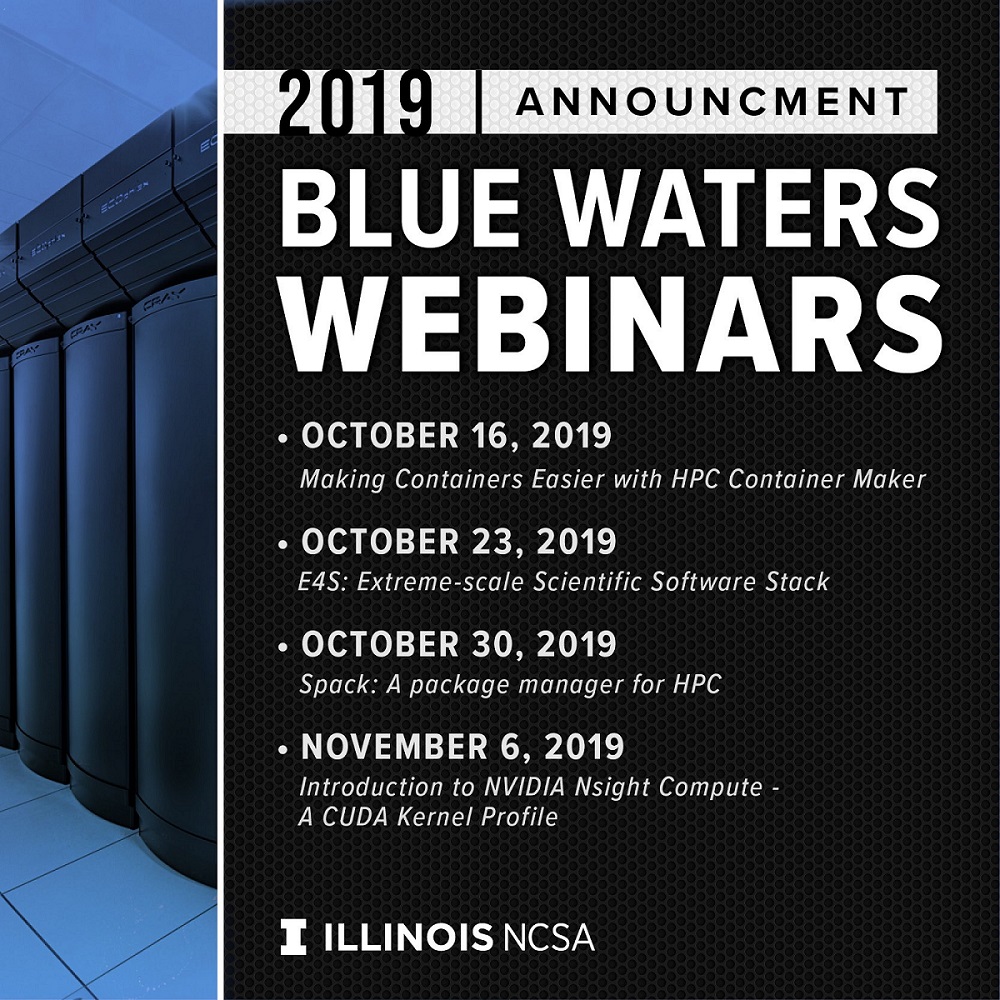Oct. 10 — The National Center for Supercomputing Applications’ (NCSA) Blue Waters project offers a webinar series that addresses Data Analytics, Petascale Computing, Scientific Software Ecosystems, Scientific Visualization, Scientific Workflows, Software Engineering and Workforce Development and Inclusion.
Over the next two months, we will offer the following four new webinars:
- October 16, 2019: Making Containers Easier with HPC Container Maker
- October 23, 2019: E4S: Extreme-scale Scientific Software Stack
- October 30, 2019: Spack: A package manager for HPC
- November 6, 2019: Introduction to NVIDIA Nsight Compute – A CUDA Kernel Profile
The webinars are free to attend and open to the public. Registration is required to receive reminders of webinar dates and invitations to join the Slack channel to pose questions to the presenters. Abstracts for each webinar are below.

MAKING CONTAINERS EASIER WITH HPC CONTAINER MAKER
(Scott McMillan, NVIDIA)
Containers make it possible for scientists and engineers to easily use portable and reproducible software environments. However, if the desired application is not already available from a container registry, generating a custom container image from scratch can be challenging for users accustomed to a bare metal software environment. HPC Container Maker (HPCCM) is an open source project to address these challenges. HPCCM provides a high level, configurable Python recipe format for deploying HPC components into container images according to best practices. HPCCM recipes are more portable and powerful than native container specification formats, easier to create, and produce smaller, well-constructed container images.
E4S: EXTREME-SCALE SCIENTIFIC SOFTWARE STACK
(Sameer Shende, University of Oregon)
The DOE Exascale Computing Project (ECP) Software Technology focus area is developing an HPC software ecosystem that will enable the efficient and performant execution of exascale applications. Through the Extreme-scale Scientific Software Stack (E4S), it is developing a comprehensive and coherent software stack that will enable application developers to productively write highly parallel applications that can portably target diverse exascale architectures. E4S provides both source builds through the Spack platform and a set of containers that feature a broad collection of HPC software packages. E4S exists to accelerate the development, deployment, and use of HPC software, lowering the barriers for HPC users. It provides container images, build manifests, and turn-key, from-source builds of popular HPC software packages developed as Software Development Kits (SDKs). This effort includes a broad range of areas including programming models and runtimes (MPICH, Kokkos, RAJA, OpenMPI), development tools (TAU, HPCToolkit, PAPI), math libraries (PETSc, Trilinos), data and visualization tools (Adios, HDF5, Paraview), and compilers (LLVM), all available through the Spack package manager. It will describe the community engagements and interactions that led to the many artifacts produced by E4S. It will introduce the E4S containers is installed on Blue Waters (NCSA) using Shifter and this talk will demonstrate its usage.
SPACK: A PACKAGE MANAGER FOR HPC
(Todd Gamblin, Lawrence Livermore National Laboratory)
Spack is an open-source package manager for HPC. Its simple, templated Python DSL allows the same package to be built in many configurations, with different compilers, flags, dependencies, and dependency versions. Spack allows HPC end users to automatically build any of over 3,000 community-maintained packages, software developers to easily manage large applications with hundreds of dependencies, and HPC facility administrators to deploy software stacks for all of their users.
This talk will give a technical overview of Spack, as well as a brief rundown of recent developments, the longer-term Spack road map, and activities within the U.S. Exascale Computing Project (ECP).
INTRODUCTION TO NVIDIA NSIGHT COMPUTE – A CUDA KERNEL PROFILER
(Magnus Strengert, NVIDIA)
Understanding and optimizing the runtime behavior of your code can be a challenging effort but is often rewarded with significant performance gains. NVIDIA Nsight Compute is a CUDA kernel profiler that provides detailed performance data and offers guidance for optimizing your CUDA kernels. You’ll learn about how to collect a wide range of performance data for your CUDA kernels, how automatic rules help in detecting common performance pitfalls and offering guidance through the profile reports, how to quickly compare profiling results to evaluate the effects of your code changes, and how to customize the tool to fit best to your optimization workflow.
About the Blue Waters Webinars
To foster productive discussions during the live webcasts, participants are encouraged to use dedicated channels within the ncsa-bw Slack team to pose questions to the presenters as well as share information with other participants.
The video recordings of each webinar are made publicly available on YouTube, and PDFs of the slides are made available for download. Links to the YouTube videos and slides are posted at https://bluewaters.ncsa.illinois.edu/webinars.
We welcome offers to present additional topics, as well as suggestions for additional topics. Please email your comments to [email protected].
This seminar series is organized and supported by the Blue Waters project funded by the National Science Foundation.
About NCSA
The National Center for Supercomputing Applications (NCSA) at the University of Illinois at Urbana-Champaign provides supercomputing and advanced digital resources for the nation’s science enterprise. At NCSA, University of Illinois faculty, staff, students, and collaborators from around the globe use advanced digital resources to address research grand challenges for the benefit of science and society. NCSA has been advancing one third of the Fortune 50® for more than 30 years by bringing industry, researchers, and students together to solve grand challenges at rapid speed and scale.
Source: NCSA




























































